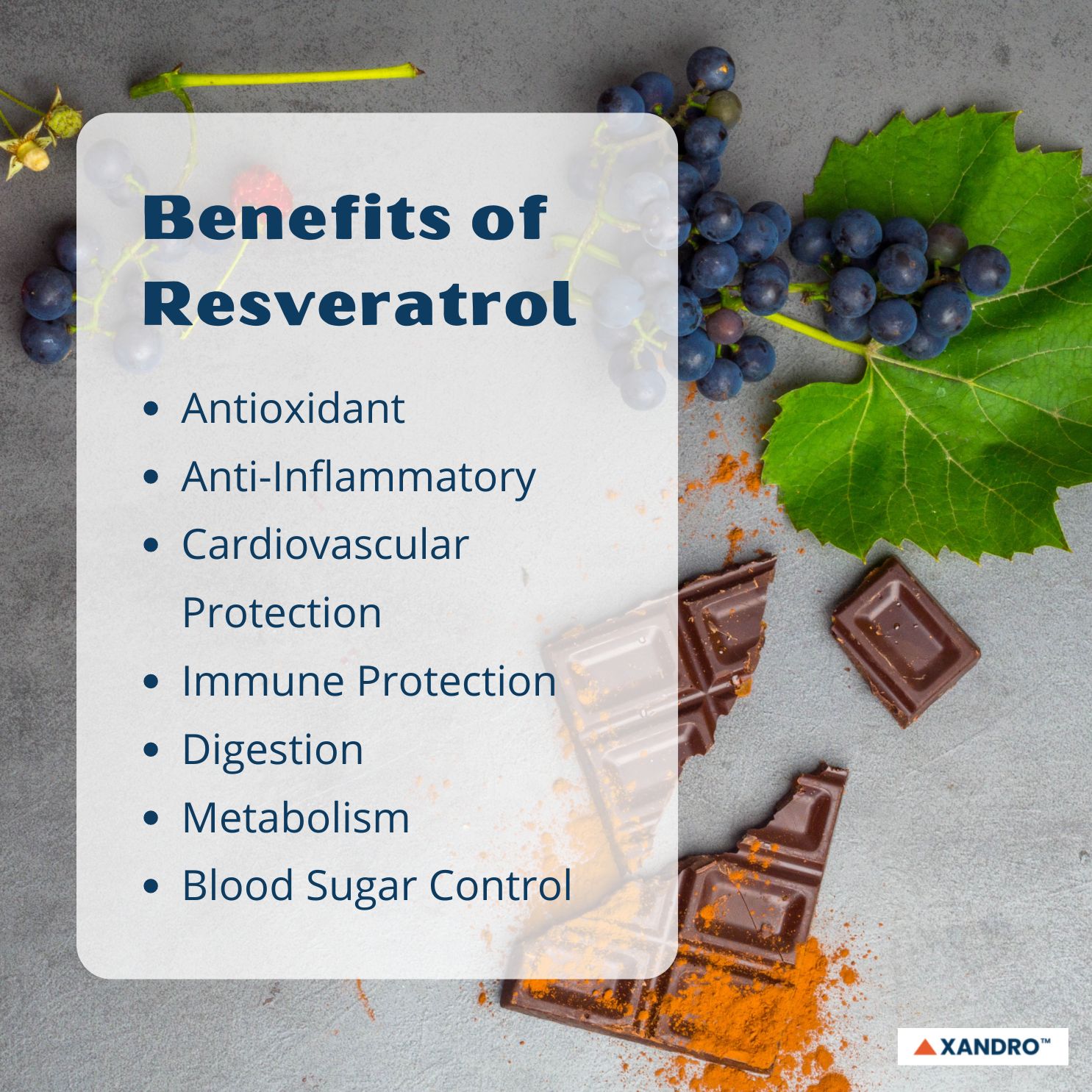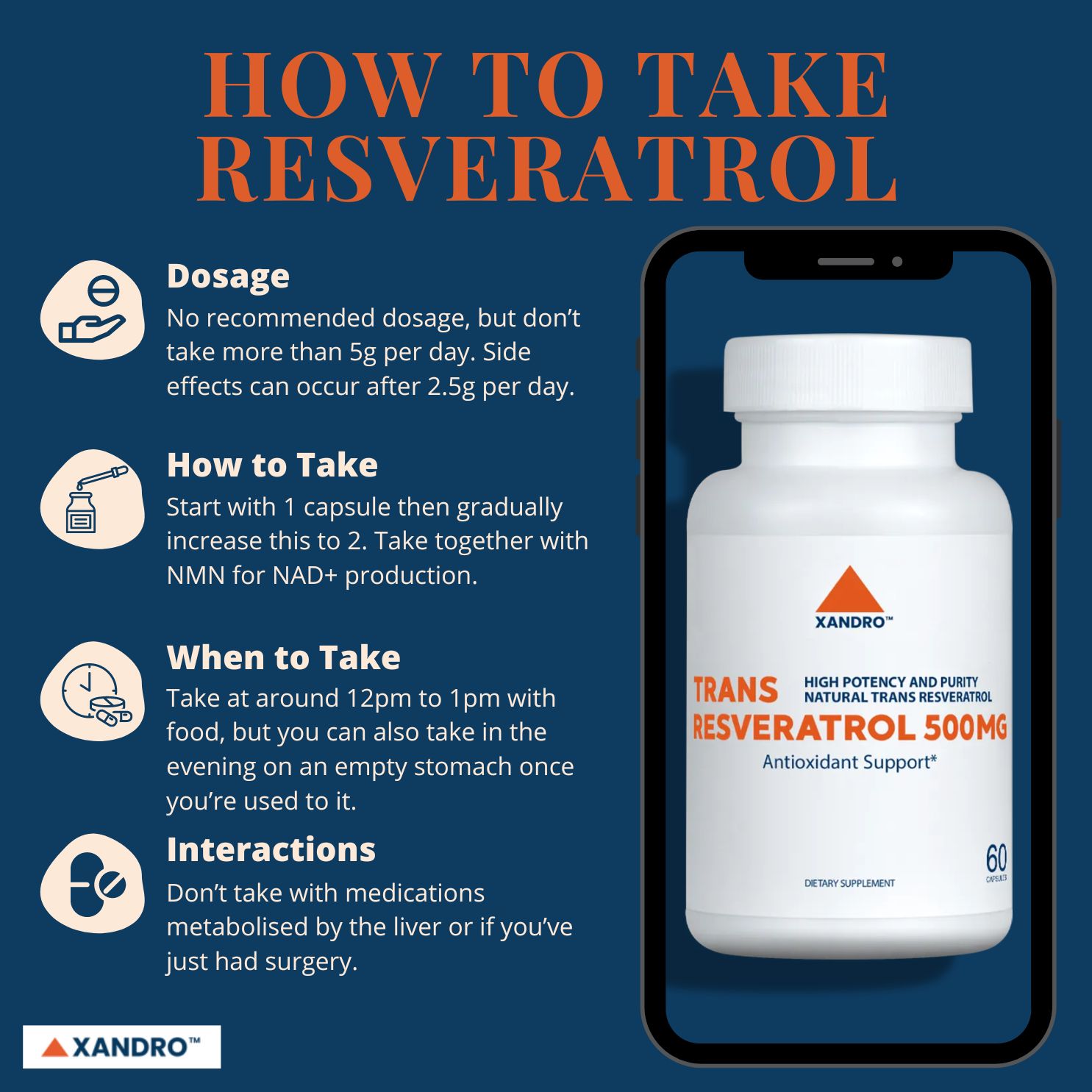Unlocking the Potential: Resveratrol and Weight Loss Explained
7th May 2024
7 Benefits of Trans-Resveratrol on Weight
Resveratrol supplement weight loss benefits may not be something you’re aware of, but there are many studies attesting to how this compound can help in your weight management journey.
This article will cover the resveratrol effect on weight, giving you all the information you need to make an informed decision about whether supplementing with resveratrol is right for you.
Jump there now:
- What Are Resveratrol Benefits?
- Does Resveratrol Help with Weight Loss?
- Which Foods Are High in Resveratrol?
- All About Resveratrol Supplements
- FAQs
Resveratrol is a type of polyphenol — plant compounds that have antioxidant properties —that has benefits on healthy aging and cardiovascular health, but it also has a range of benefits on weight loss.
Resveratrol has been found to reduce body mass, weight, BMI and fat mass in obese patients while increasing lean mass. It’s a great long-term supplement to take for weight loss, especially with its other benefits for longevity.
Let’s dive into how resveratrol specifically helps with weight loss.
- Antioxidant: Is resveratrol an antioxidant? Yes! As an antioxidant, resveratrol helps protect cells from damage caused by free radicals. These are unstable molecules that can damage our DNA and contribute to disease and aging. It also helps enhance our natural cellular defence and lower our blood pressure.
- Anti-inflammatory: Has anti-inflammatory properties and is able to suppress oxidative stress. It also has the potential to reduce inflammation in those with liver disease, obesity and even in people without chronic conditions.
- Cardioprotective Properties: Does resveratrol lower blood pressure? Resveratrol helps us maintain a healthy blood pressure, which supports healthy heart function.
- Immune Protection: Resveratrol supports our immune health by improving our immunity as well as helping our immune system adapt.
- Digestion: Resveratrol may also help regulate our gut bacteria. It does this by promoting the growth of good bacteria and preventing the growth of bad ones. Did you know resveratrol is also found in pomegranates, with pomegranate supplements also helping with weight loss? Check out Xandro Lab’s POM-Q10 supplements!
- Metabolism: What about resveratrol and belly fat? Resveratrol supplementation has shown improvements in weight by decreasing body mass, BMI, fat mass and waist circumference due to its benefits on our metabolism. Especially in those with obesity and type 2 diabetes, resveratrol has been shown to boost metabolism and help increase fat burning. What’s more, due to its effects on metabolic changes, resveratrol has also been found to mimic calorie restriction.
- Blood Sugar: Resveratrol has been found to prevent high blood sugar and benefit type 2 diabetes by lowering blood glucose, insulin levels and insulin resistance and improving HDL levels and fasting blood glucose.

Further Reading: Top Antioxidants against ROS
Resveratrol is naturally found in foods like grapes, peanuts, berries, cocoa beans and knotweed, meaning it’s also found in red wine and chocolate.
Keep in mind though that the amounts used in human and animal studies are higher than those you would be able to obtain through the foods we eat. This means that in order to experience these resveratrol benefits, you’re going to need to take resveratrol supplements.
Further Reading: Resveratrol and Brain Function
Resveratrol vs Trans Resveratrol
Resveratrol comes in two forms (isomers), known as cis- and trans-. Trans-isomers are the more stable form and have been studied for their potential therapeutic effects, with trans-resveratrol having strong antioxidant activity.
Resveratrol is simply the name people use when talking about these supplements, but the active ingredient, the more absorbable form, is called trans-resveratrol; they’re just different forms of the same compound. In fact, trans-resveratrol can actually be absorbed 30 times faster than resveratrol, so you will want to make sure you’re taking trans-resveratrol.
How Much Resveratrol Should I Take?
There is actually no recommended resveratrol dosage, but clinical trials have found it safe to take up to 5g, with minor side effects, like nausea, flatulence and stomach cramps possibly occurring after more than 2.5g per day.
As for the resveratrol weight loss dosage, studies have tested dosages between 150mg to 1500mg of daily resveratrol.
How to Take Resveratrol for Weight Loss
Follow the instructions of the resveratrol supplement you’re taking, but for Xandro Lab’s Trans-Resveratrol supplement, start with one capsule, then increase this to two after two weeks to allow your body to acclimatise to the compound — reducing the chance of side effects. Resveratrol is a supplement that’s great to take with NMN as they are both used for NAD+ production. Check out Xandro Lab’s Pure NMN Powder and Pure NMN Capsules!
Further Reading: When to take NMN and Trans-Resveratrol
Always speak with your doctor before adding any new supplement to your diet, as they can tell you if it’s right for you. If you take medications that are metabolised by the liver or if you’ve just had surgery (to reduce bleeding risks), don’t take trans-resveratrol. Resveratrol can also mimic estrogen and may worsen certain medical conditions.
Best Time to Take Resveratrol
Take trans-resveratrol at around 12pm to 1pm, preferably with food. Keep in mind that some people have found that taking resveratrol on an empty stomach works best for them. Whatever you choose, make sure to create a routine and be consistent to build the resveratrol levels in your body.

End Note
Resveratrol isn’t a new supplement. It’s been used in clinical trials for decades and is even used by many around the world, such as Dr. David Sinclair and even Joe Rogan.
Looking for the best resveratrol for weight loss? Try out Xandro Lab’s Trans-Resveratrol 500mg to experience resveratrol benefits today! You can also read about resveratrol for weight loss reviews to help you figure out if a resveratrol supplement is right for you.
Can Resveratrol Help You Lose Weight?
As seen above, studies suggest that resveratrol may help with weight loss by increasing metabolism and reducing fat storage, as well as due to its effects as an antioxidant and anti-inflammatory, its benefits on heart health, the immune and digestive systems, and its benefits on blood sugar.
Does Resveratrol Increase Appetite?
Currently, there's no clear evidence to suggest that resveratrol increases appetite. It’s actually been found to mimic calorie restriction and intermittent fasting, meaning it may have appetite-suppressing effects.
Does Resveratrol Give You Energy?
While it’s not typically considered a direct energy booster like caffeine or other stimulants, resveratrol may indirectly boost energy levels by improving mitochondrial function and increasing endurance during physical activity.
How Long Does It Take to See Results from Resveratrol?
Resveratrol is a supplement you should take long term to experience its benefits, such as helping with aging, lowering blood pressure and helping our brain health due to its antioxidant and anti-inflammatory properties. For weight loss, though, especially in people with obesity, you might see results after 30 days due to its metabolic benefits in mimicking the effects of calorie restriction.
Further Reading: Resveratrol and Blood Pressure
Does Curcumin and Resveratrol Help You Lose Weight?
What about turmeric and resveratrol for weight loss? Curcumin, the active compound in turmeric, and resveratrol have both been studied for their potential weight loss benefits. Some research suggests that combining them may have synergistic effects on weight management, but more studies are needed to confirm this.
Is Resveratrol Good for skin?
As an antioxidant, resveratrol can help protect the skin against environmental stress and can support cell health by protecting the skin from damage caused by free radicals. If used in a cream, you may see results on damaged skin after the first use, or after a few weeks, but use it for up to six to 12 months for visible results.
Does Resveratrol Lower Cholesterol?
Resveratrol has been shown to have potential cholesterol-lowering effects. It may help increase levels of HDL cholesterol (the ‘good’ cholesterol) and reduce LDL cholesterol (the ‘bad’ cholesterol) oxidation. A study found that those who took resveratrol for six months experienced a reduction in LDL cholesterol, with oxidised LDL reducing 20 per cent compared to those who didn’t take it.

